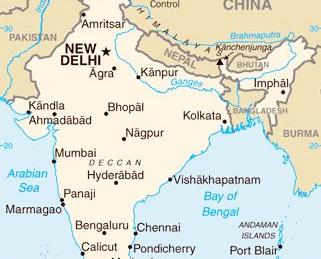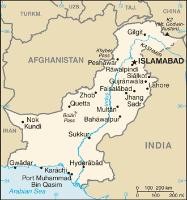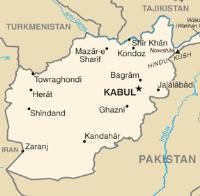AFOE’s Edward Hugh offers a solid analysis of the current financial turmoil roiling Russian markets, that among other things debunks the idea that the invasion of Georgia was an essential cause — as opposed to a catalyzing event — of the capital flight in the invasion’s aftermath. In other words, absent other fundamental weaknesses and contributing factors, there’s no way of knowing whether globalized markets would have “punished” Russia’s muscle-flexing in the Caucasus. While most of the loud arguments about the Russian invasion have framed it in terms of NATO enlargement and some sort of moral obligation to defend Georgia’s […]
South Asia Archive
Free Newsletter
Arif Rafiq at Pakistan Policy Blog explains why you’d need to take the best parts of Obama’s approach, the best parts of McCain’s approach, then improve them both significantly, before you’d have a viable Pakistan policy. Very good analysis worth reading. Rafiq makes the point that both candidates continue to emphasize a Musharraf-centric rhetoric that was perhaps relevant during the winter primary campaign, but ignores the ways in which Pakistan’s situation has dramatically changed over the past nine months. The major problem with Obama’s Pakistan policy is his insistence on unilateral strikes against high-value al-Qaida targets within Pakistani territory. As […]
When Pakistan’s new president, Asif Ali Zardari, met privately with U.S. President George W. Bush on the sidelines of the U.N. General Assembly in New York Tuesday, the deteriorating security situation along the Afghan-Pakistani border was certainly a central topic of discussion. But while cross-border attacks from both sides of the frontier are seriously exacerbating relations between Afghanistan, Pakistan, and the United States, they might also paradoxically be driving the three countries to consider ever-deeper levels of cooperation. Afghan officials, and their American and NATO allies, have long criticized their Pakistani counterparts for failing to suppress the numerous Islamist militants […]

NEW DELHI — The series of deadly bomb blasts that shook India’s capital on Sept. 13 has prompted some of the usual finger pointing at Pakistan, but most evidence suggests the attacks were perpetrated by homegrown Islamist militants, and there is growing recognition here that the increasing activity of such groups poses a huge challenge to India’s anti-terror capabilities. A shadowy Muslim group, the Indian Mujahedeen, claimed responsibility for the five attacks that left 24 dead and at least 100 injured at commercial and tourist hubs around New Delhi. The serial attacks constituted the fourth separate such incident in as […]
Pakistan officials say U.S. cross-border strikes are counterproductive. Defense Secretary Gates is coy about whether the Pakistani government authorized the strikes, and says the U.S. will “take whatever action is necessary to protect our troops.” From a counterinsurgency perspective, are such strikes the best way to protect our troops? Retired Lt. Col. John Nagl doesn’t appear to think so. Here’s what he said in an interview we published today: It is impossible to kill or capture your way out of an insurgency. Although cross-border raids can be tactically effective, they come with significant political costs that must be weighed carefully. […]
Ever wonder what would happen in an alternate universe where, instead of haunting Fox News studios, John Bolton had been born in India? Well, he’d probably be named Bharat Verma, and he’d probably be the Editor of the Indian Defense Review. And not only would he be glad about the instability threatening Pakistan’s existence, he’d be actively encouraging it and lauding the benefits resulting from the “cessation of Pakistan as a state”: Pakistan’s breakup will be a major setback to the Jihad Factory, asthe core of this is located in Pakistan, and functions with the help ofits army and the […]
John A. Nagl, 42, is a senior fellow at the Center for a New American Security. He is a retired Army lieutenant colonel, a veteran of both Operation Desert Storm and the current conflict in Iraq, and was one of the writers of the Army/Marine Corps Counterinsurgency Field Manual. He is also the author of “Learning to Eat Soup with a Knife,” published in 2005. In that book he uses archival sources and interviews to compare the development of counterinsurgency doctrine and practice in the 1948-1960 Malayan Emergency with the strategy used in the Vietnam War. Urs Gehriger of the […]
Yesterday, I linked with arithmetic snark but without comment to TX Hammes’ Small Wars Journal post on the broadening of the Afghanistan War into Pakistan. It’s a very important piece, because it points out the danger of seeing Pakistan exclusively through the lens of our own tactical needs in Afghanistan, while ignoring the fact that for Pakistan, managing the Taliban (whether in Afghanistan or its own tribal areas) is part of the broader strategic calculus of its rivalry with India. Hammes argues that until we develop a strategy for handling this broader regional architecture, our efforts in Afghanistan (which he […]

In the last 12 months, events in Pakistan have developed at a frenetic pace. In October 2007, Benazir Bhutto returned to her homeland following years of exile and was greeted as a savior by millions of followers. Just two months later, in December, she was assassinated in an attack whose authors have still not been identified. Shortly after that, the political decline and fall of her rival Pervez Musharraf began. First the general lost the parliamentary elections, then his post as head of the army, and finally the presidency itself. Earlier this month, the widower of Benazir Bhutto, Asif Ali […]

The U.S.-Indian civilian nuclear agreement may still have to clear the U.S. Congress, but Indian firms and industry groups are already celebrating the Nuclear Suppliers Group’s decision this month that effectively gave the agreement a green light by waiving a ban on the country engaging in nuclear trade. The U.S.-India Business Council, which has lobbied hard in support of the bilateral agreement that followed a joint statement in 2005 by President George Bush and Indian Prime Minister Manmohan Singh, described the waiver as “a historic step forward for India and the world,” while the Confederation of Indian Industry said it […]
Nikolas Gvosdev makes a good point. Dealing with Pakistan’s military hasn’t necessarily been straightforward these past seven years. They’ve got their own agenda, and haven’t been afraid to pursue policies — both overt (ie. negotiated peace deals with Pakistani-based Taliban) and covert (ie. support for Afghan-based Taliban) — that are at odds with American interests. But at least they couldn’t use claims of democratic legitimacy as cover. Now with the return of civilian rule in Islamabad, we’ve got to consider the possibility that not only are we not going to get what we want from the Pakistanis, but that they […]
As Judah points out, the problem of the Pakistan-Afghanistan border region is beginning to get some attention. There are two basic ways to fight the Pakistani Taliban who are using that country’s border region (Baluchistan, and the Federally Administered Tribal Areas mostly, as I understand it) as a safe haven from which to undermine the Afghan government and attack U.S. troops. One is to launch raids from Afghanistan using special operations forces, drones and other air assets, which U.S. forces appear to be doing more and more of. The other is to put troops on the ground in Pakistan. Putting […]

MAZAR-I-SHARIF, Afghanistan — The kinds of tourists you meet in Afghanistan are not quite the same as those you’d be likely to meet on the Costa del Sol. First of all, there are fewer of them, far fewer — perhaps only a few hundred a year. But if it can be said that Costa del Sol tourists share at least one trait in common (a love of the sun), today’s visitors to Afghanistan share something else: curiosity, perhaps with a dash of recklessness. While post-invasion Afghanistan has never descended into the kinds of violence and anarchy seen in Iraq, it […]
The widower of Benazir Bhutto, Asif Ali Zardari, will be Pakistan’s next president after winning a majority in today’s elections. Zardari wrote an op-ed in the Washington Post on Thursday in which he promised, if elected, to amend the consitution to reduce the powers of the presidency, enhance the power of the legislature, and restore an independent judiciary. He also pledged to “work to defeat the domestic Taliban insurgency and to ensure that Pakistani territory is not used to launch terrorist attacks on our neighbors or on NATO forces in Afghanistan.” Will he follow through on these promises? We’ll see. […]
In the Sergio Leone-inspired, and admittedly simplistic, formulation of the above headline, Iraq is the good, Somalia is the bad, and Pakistan’s Federally Administered Tribal Areas (FATA) are the ugly. The must-read from today’s media roundup of commentary concerns Iraq and comes from CNAS’s Nagl, Kahl and Brimley. The three analysts recently returned from Iraq advise policymakers on “How to Exit Iraq,” saying the answer has little to do with “‘all in’ or ‘all out’ way that Iraq is debated in Washington” at the moment. The most worrying piece of analysis I saw in today’s papers assesses U.S. and Ethiopian […]

Following years of promising gains since 2001, Afghanistan is in a tailspin. Not long ago, a sophisticated Taliban assault on a Kandahar prison freed 1,200 inmates, including 350 Taliban members. The attack came only weeks after Afghan President Hamid Karzai survived a fourth assassination attempt. The main forces behind the country’s downward spiral are al-Qaida and the Taliban, which have found sanctuary in the vast unpoliced region of western Pakistan known as the Federally Administered Tribal Areas (FATA). Stabilizing the Afghan-Pakistani front of the war on terrorism will require U.S. policymakers to re-examine the fatal misconception that they face only […]
